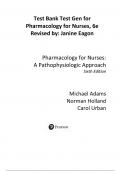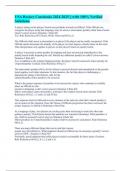Test Bank Test Gen for
Pharmacology for Nurses, 6e
Revised by: Janine Eagon
Pharmacology for Nurses:
A Pathophysiologic Approach
Sixth Edition
Michael Adams
Norman Holland
Carol Urban
,Pharmacology for Nurses, 6e (Adams)
Chapter 1 Introduction to Pharmacology
1) A nurse is reviewing key events in the history of pharmacology with a student nurse.
Which student comment indicates an understanding?
1. "Early researchers used themselves as test subjects."
2. "A primary goal of pharmacology is to prevent disease."
3. "Penicillin is one of the initial drugs isolated from a natural source."
4. "Pharmacologists began synthesizing drugs in the laboratory in the nineteenth
century."
Answer: 1
Explanation:
1. Some early researchers, like Friedrich Serturner, used themselves as test
subjects.
2. An early goal of pharmacology was to relieve human suffering.
3. Initial drugs isolated from complex mixtures included morphine, colchicine,
curare, and cocaine, but not penicillin.
4. By the twentieth century, pharmacologists could synthesize drugs in the
laboratory.
Page Ref: 3
Cognitive Level: Applying
Client Need/Sub: Physiological Integrity: Pharmacological and Parenteral Therapies
Standards: QSEN Competencies: I.A.1 Integrate understanding of multiple dimensions
of patient-centered care: patient/family/community preferences, values; coordination
and integration of care; information, communication, and education; physical comfort
and emotional support; involvement of family and friends; and transition and continuity.
| AACN Essential Competencies: I.7 Integrate the knowledge and methods of a variety of
disciplines to inform decision making. | NLN Competencies: Knowledge and Science:
Integration of knowledge from nursing and other disciplines. | Nursing/Integrated
Concepts: Nursing Process: Evaluation
Learning Outcome: 1-1 Identify key events in the history of pharmacology.
MNL Learning Outcome: 1.1 Examine the relationship between medicine and
pharmacology.
2) A student nurse asks a nursing instructor why anatomy and physiology as well as
microbiology are required courses when the student only wants to learn about
pharmacology. What is the best response by the instructor?
1. "Because pharmacology is an outgrowth of those subjects."
2. "You must learn all, since all of those subjects are part of the curriculum."
3. "Knowledge of all those subjects will prepare you to administer medication."
4. "An understanding of those subjects is essential to understand pharmacology."
Answer: 4
Explanation:
1. Pharmacology is an outgrowth of anatomy, physiology, and microbiology, but
this is not the most essential reason for the nurse to learn them.
2. The nurse must learn anatomy, physiology, and microbiology to understand
pharmacology, not because they are part of the curriculum.
, 3. Knowledge of anatomy, physiology, and microbiology prepares the nurse to
understand pharmacology, not to provide care such as administration of
medications.
4. It is essential for the nurse to have a broad knowledge base of many sciences in
order to learn pharmacology.
Page Ref: 3
Cognitive Level: Applying
Client Need/Sub: Physiological Integrity: Pharmacological and Parenteral Therapies
Standards: QSEN Competencies: I.A.1 Integrate understanding of multiple dimensions
of patient-centered care: patient/family/community preferences, values; coordination
and integration of care; information, communication, and education; physical comfort
and emotional support; involvement of family and friends; and transition and continuity.
| AACN Essential Competencies: I.7 Integrate the knowledge and methods of a variety of
disciplines to inform decision making. | NLN Competencies: Knowledge and Science:
Integration of knowledge from nursing and other disciplines. | Nursing/Integrated
Concepts: Nursing Process: Implementation
Learning Outcome: 1-2 Explain the interdisciplinary nature of pharmacology, giving an
example of how knowledge from different sciences impacts the nurse's role in drug
administration.
MNL Learning Outcome: 1.1 Examine the relationship between medicine and
pharmacology.
3) A nurse is teaching a group of nurses about the differences between pharmacology
and therapeutics. The nurse determines that learning has occurred when which
statements are made?
Note: Credit will be given only if all correct choices and no incorrect choices are selected.
Select all that apply.
1. "Pharmacology is the development of medicines."
2. "Pharmacology is the study of medicines."
3. "Therapeutics relates to drug use to treat suffering."
4. "Therapeutics is the study of drug interactions."
5. "Pharmacology is the study of drugs to prevent disease."
Answer: 2, 3, 5
Explanation:
1. Pharmacology is not the development of medicines.
2. Pharmacology is the study of medicines.
3. Therapeutics is the use of drugs in the treatment of suffering.
4. Therapeutics is not related to study of drug interactions.
5. Pharmacotherapy is the application of drugs for the purpose of disease
prevention.
Page Ref: 4
Cognitive Level: Applying
Client Need/Sub: Physiological Integrity: Pharmacological and Parenteral Therapies
Standards: QSEN Competencies: I.A.1 Integrate understanding of multiple dimensions
of patient-centered care: patient/family/community preferences, values; coordination
and integration of care; information, communication, and education; physical comfort
and emotional support; involvement of family and friends; and transition and continuity.
, | AACN Essential Competencies: I.7 Integrate the knowledge and methods of a variety of
disciplines to inform decision making. | NLN Competencies: Knowledge and Science:
Integration of knowledge from nursing and other disciplines. | Nursing/Integrated
Concepts: Nursing Process: Evaluation
Learning Outcome: 1-3 Compare and contrast therapeutics and pharmacology.
MNL Learning Outcome: 1.1 Examine the relationship between medicine and
pharmacology.
4) A nurse administers a vaccine to a client. What is the nurse's best understanding as
it relates to the manufacture of a vaccine?
1. The vaccine is produced by natural plant extracts in the laboratory.
2. The vaccine is naturally produced in animal cells or microorganisms.
3. The vaccine is produced by a combination of animal and plant products.
4. The vaccine is most commonly synthesized in a laboratory.
Answer: 2
Explanation:
1. Vaccines are not produced by natural plant extracts.
2. Vaccines are naturally produced in animal cells, microorganisms, or by the body
itself.
3. Vaccines are not produced by a combination of animal and plant products.
4. Vaccines are not synthesized in a laboratory.
Page Ref: 4
Cognitive Level: Applying
Client Need/Sub: Physiological Integrity: Pharmacological and Parenteral Therapies
Standards: QSEN Competencies: III.A.1 Demonstrate knowledge of basic scientific
methods and processes. | AACN Essential Competencies: IX.3 Implement holistic,
patient-centered care that reflects an understanding of human growth and
development, pathophysiology, pharmacology, medical management, and nursing
management across the health-illness continuum, across lifespan, and in all healthcare
settings. | NLN Competencies: Knowledge and Science: Integration of knowledge from
nursing and other disciplines. | Nursing/Integrated Concepts: Nursing Process:
Evaluation
Learning Outcome: 1-4 Compare and contrast traditional drugs, biologics, and
complementary and alternative medicine therapies.
MNL Learning Outcome: 1.1 Examine the relationship between medicine and
pharmacology.
5) An older client is admitted with gastrointestinal bleeding. The client says to the
nurse, "I don't understand this. All I did was take ibuprofen (Advil) for my arthritis."
What is the nurse's best response?
1. Review nonpharmacologic methods to relieve joint pain.
2. Encourage the client to substitute safer drugs, such as acetaminophen (Tylenol).
3. Remind the client to contact their healthcare provider before taking any over-
the-counter (OTC) medications.
4. Teach the client about the side effects of ibuprofen (Advil).
Answer: 4
Explanation:





